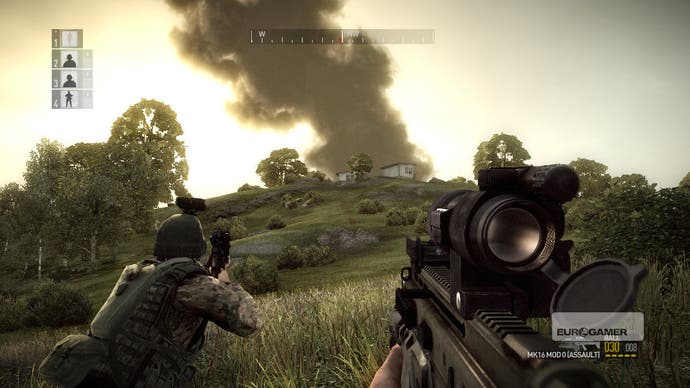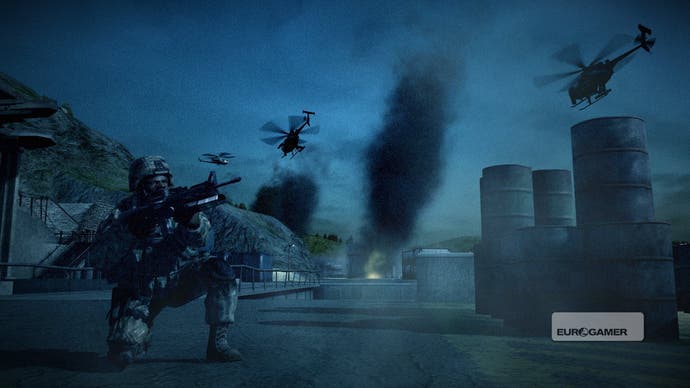Operation Flashpoint: Dragon Rising
Operator's manual.
I once got lectured by a man at a wedding about Operation Flashpoint. I'd made the mistake of mentioning what I do for a living, but instead of smiling, nodding and pretending to listen while I explained just what a burden it is deciding between two numbers all the time, he went a little purple and asked if I'd heard of ArmA. I didn't have time to answer before he launched into a fifteen-minute tirade against Codemasters, accusing them of being traitorous and misleading money-grabbers for making a game under the name Operation Flashpoint while its real creators Bohemia Interactive, supported by a real community of real fans, were making real sequels to the most real war game ever made and didn't I think it would be worth writing an exposé about that?
I smiled, nodded and pretended to listen. But the fact is, this man was and is no kind of lone nutter. Another acquaintance once gave up a lucrative city job so he could sit around in his dressing gown making Flashpoint maps all day, and Bohemia's own reaction to the great pretender Dragon Rising rearing its head was just as vituperative as its fans'. Flashpoint - the real Flashpoint - means an awful lot to an awful lot of people.
So when it arrives in October - eight years after the original, two-and-a-half after Bohemia's ArmA: Armed Assault, and less than six months after the excellent ArmA II - Codemasters' game faces expectations that can't possibly be met and minds that refuse to be changed. Many people who ought to treat it like a second coming - fans of the realistic, military simulation FPS - won't even give it the time of day. Codemasters will have to go back to square one and persuade everyone else, including people with games consoles, that they want to play a game where getting shot actually kills you.
For an overview of how they plan to do that, check out our previous Operation Flashpoint: Dragon Rising previews. In brief: the setting is contemporary, with the US Marines stepping in to help repel a Chinese invasion of an oil-rich, Russian-owned island in the Pacific. There's one huge, contiguous island map, free-roaming and free-form combat within mission structures, loads of authentic vehicles and equipment to use, tactical command of a four-man squad via a quick-command menu, strategic command of larger forces from the map, and online co-op and multiplayer.

All of which ticks the right boxes, as did the several glimpses we've had of the game running on high-end PCs. But the questions remain: how will Codemasters' in-house team deliver all this grandiose, granular simulation in a playable and - saving the war-is-hell brigade's graces - entertaining form across several formats? How will they differentiate it from its compulsively comprehensive rival, and how, if at all, will they draw more casual shooter fans into the fold?
An Xbox 360 preview version, featuring two single-player campaign missions, gives some idea. The first impression is made by the sort of slick, atmospheric front-end that Codemasters has been gracing its racing games with of late. Layers of grainy, black-and-white photography glide by under minimal fonts and that mournful, ululating ethnic singing that film-makers currently associate with the horrors of war, for some reason. If Modern Warfare is Hollywood's war, then this is Sundance's: hard-hitting, unvarnished, documentary-style.
Good presentation is one thing the original Operation Flashpoint lacked, but in this game, presentation is everything. It's not put in the service of spectacular set-piece but rather of putting your boots on the ground in an actual conflict situation, giving you the sights and sounds of being there as well as the feel and challenge.

It's graphically subtle - overcast skies, long grasses, copses of trees, broken walls, shabby barns - and on 360, it skimps a little on detail and effects in order to give you the freedom and the breathtaking draw distance. So Dragon Rising doesn't really reveal itself to you until you reach the summit of a hill in the first mission - goal: to disable an early-warning radar on a small outpost island - and use your binoculars to scope out the village in the scooped valley below. This game does naturalistic terrain exceptionally well, especially vegetation and the subtle but vitally useful elevation changes in the rolling landscape. You soon start thinking about cover in terms of the lie of the land rather than the lie of the conveniently placed crates.
It's around this time that the fantastic audio hits you as the bullets don't - just. A realistic soundscape is a very rare thing in games, but Operation Flashpoint has one, and just like the graphics, it's mostly about emphasising one thing - distance. Bullets, after all, travel over long distances, so you're often trading them with men who are very far away, just pixellated specs if you don't equip a scoped weapon.


